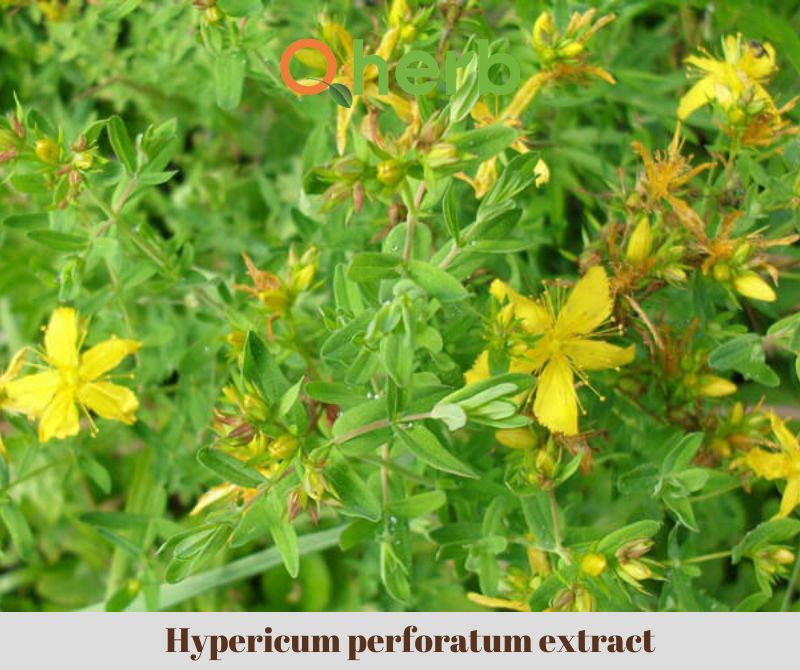Relax with Hypericum perforatum extract
Regular use of Hypericum extract eliminates feelings of anxiety, fear, loneliness and fatigue. Hypericum perforatum extract have a tonic, anti-inflammatory, antimicrobial, anthelmintic, diuretic, and antispasmodic action. It is used for problems with bile outflow and kidney disease, with bedwetting in children, hypertension, menopause, poor sleep, and neurotic disorders.
Hypericum perforatum L. is a perennial herbaceous plant of the mammal. Other names: St. John's wort piercer-leaf, ordinary, hare's blood, branch, St. John the Baptist, the grass of John the Baptist, the grass of St. John, Hypericum, etc.
In folk beliefs, St. John's wort is a source of light, eliminating evil, driving away the spirits of longing, relieving black sorrow. This belief has been preserved for millennia. More Paracelsus ranked St. John's wort to his favorite plants. Hypericum from ancient times is known for its positive healing effect on the soul. Its action as an antidepressant is currently scientifically based.
In the European Region, St. John's Wort is ranked as a medicinal herb and is widely used in traditional medicine. And in folk medicine, St. John's wort is one of the most commonly used medicinal plants, along with chamomile.
Raw Hypericum (flowers) contains triterpene saponins, anthracene derivatives (hypericin, pseudohypericin), bioflavonoids (hyperoside, rutin, and quercetin), tannins, essential oil, carotenoids and other compounds.
The most important pharmacological effect of Hypericum is the effect on the level of serotonin in the central nervous system, which determines the antidepressant properties of the plant, primarily due to hypericin.
Therefore, St. John's wort can be considered as a plant antidepressant and used for menopausal conditions associated with neurotic disorders.
Mild and relaxing effects
It has long been noted that at the beginning of its intake, the patients had a mild sedative effect, which then led to an improvement in mood and inner comfort. Regular use eliminates a feeling of anxiety, fear, irritability, loneliness, fatigue.
In addition, St. John's wort has a tonic, anti-inflammatory, antimicrobial, anthelmintic, diuretic, antispasmodic action. Therefore, it is used for dyskinesia of the biliary tract and gallbladder, hepatitis, cholecystitis, gastritis with secretory insufficiency, flatulence, kidney disease, accompanied by fluid retention, during bedtime urinary incontinence in children, hypertension, and neurocirculatory dystonia.
At the same time, Hypericum perforatum extract improves lipid metabolism (lipid) metabolism, lipid peroxidation and antioxidant system up to their normalization and is indicated for the prevention of atherosclerosis, coronary heart disease and brain, heart attack and stroke, hypertension and other cardiovascular diseases.
The drug in Hypericum perforatum extract contains St. John's wort with the optimal amount of hypericin needed to ensure effective effects on the body without negative consequences. It is characterized by low toxicity and good tolerability: no side effects are observed.
Pharmacological properties of Hypericum perforatum:
The pharmacological properties of Hypericum are determined by its chemical composition.
Hypericum herb contains a variety of biologically active compounds and has many-sided pharmacological properties.
The most active compounds are flavonoids, which have a spasmolytic effect on the smooth muscles of the bile ducts of the intestine, blood vessels and ureters. Flavonoids increase the outflow of bile, prevent bile stasis in the gallbladder and thus prevent the formation of stones, facilitate bile secretion in the duodenum by reducing spasm of the sphincter of the hepato-pancreatic ampoule. Flavonoids also suppress spasms of the large and small intestines, restore normal peristalsis, thereby improving the digestive capacity of the gastrointestinal tract.
St. John's wort not only relieves spasm of blood vessels, especially capillaries, but also has a capillary strengthening effect, typical of compounds containing vitamin R.
In addition, Hypericum preparations improve the venous circulation and blood supply of some internal organs, and also increase diuresis by reducing the tension of the walls of the ureters and directly increasing filtration in the renal glomeruli.
When ingested, hypericin plays the role of a kind of catalyst for certain intracellular reactions and a factor regulating the vital processes of the body. In addition, hypericin is a photodynamic substance that increases the absorption of ultraviolet rays by the skin, but it is not soluble in water, therefore hypericin is not detected in infusions and decoctions, but is present in alcohol extracts and in the sap of the plant.
High antibacterial activity of ether, alcohol, acetone and other extracts from Hypericum perforatum has been established. They act on Staphylococcus aureus and other bacteria. These data were the basis for further detailed study of the properties of Hypericum in order to obtain new antimicrobial agents.



 Healthier Future
Healthier Future